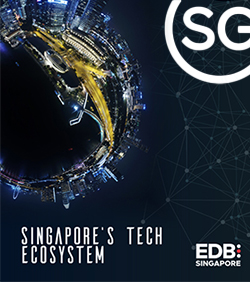IN PARTNERSHIP WITH

IN PARTNERSHIP WITH

There’s no surefire recipe to recreate Silicon Valley’s confluence of geography, tech genius, timing and good luck that have given rise to the likes of Google, Oracle and Apple, among so many other world-shaking companies.
But business leaders eager to find the next hotbed of innovation can — and should — search for the rare ingredients that have combined to attract generations of tech visionaries and VCs to Silicon Valley.
For scores of businesses around the world, that search often leads to Singapore.
Once a sleepy fishing village, the island city-state has emerged as a properous technology hub (a “miniature Silicon Valley,” according to Hewlett Packard Enterprise (HPE) CEO Meg Whitman) in the heart of Southeast Asia. Today, 80 of the top 100 tech firms in the world have a presence in Singapore, reinforcing its status as a major East-West trading center and the gateway to the lucrative Asian marketplace.
Why has Singapore become such an irresistible magnet to global tech giants? Companies routinely cite four big advantages to working in the country.
WORLD-CLASS INNOVATION:
Looking for tech breakthroughs? So is Singapore. Invention and innovation are a integral part of its business culture. Here, global enterprises and startups frequently collaborate on projects — and analysts have taken notice. The 2017 Global Innovation Index ranked Singapore as the most innovative country in Asia, while the 2017 Bloomberg Innovation Index ranked Singapore sixth globally. That’s a big reason why companies like Amazon and IBM are using Singapore to pilot groundbreaking new projects before they roll them out globally.
LIGHTNING-FAST, MODERN IT INFRASTRUCTURE:
Singapore’s plug-and-play business environment lets tech companies hit the ground running almost immediately. In Singapore, businesses get instant access to one of the most technologically advanced IT infrastructures in the world. In fact, Singapore was ranked first in digital infrastructure in the Economist Intelligence Unit’s latest Asian Digital Transformation Index. Companies can tap into that infrastructure to easily test and pilot new products as soon as they set up their WiFi network.
RIGOROUS IP PROTECTION:
For tech companies, nothing is more valuable than their intellectual property. In Asia, horror stories abound of opportunistic firms ripping off another company’s tech innovations to make a quick profit. But Singapore’s IP laws are not only tough — they’re well enforced. The Singapore government’s commitment to a strong IP regulatory framework gives companies confidence that their R&D investments will stay protected. The country ranks first among all Asian countries, and fourth in the world, for intellectual property rights protection, according to the World Economic Forum.
DEEP, HIGHLY SKILLED TALENT POOL:
Technology only gets you so far; if you want to build a successful business, it’s the people you hire who really make a difference. Singapore offers one of the most well-educated and highly skilled talent pools in Asia. The most recent Global Talent Competitiveness Index ranks Singapore second in the world and the only Asian country in the top 10 when it comes to attracting talent. More than that, Singapore’s diverse population is among the most Western-friendly in all of Asia. With few cultural and language barriers — English, one of four official languages in Singapore, is widely spoken — managers from the U.S. and Europe find it easy to assimilate their workforce here.
Taken together, these conditions make Singapore a near-perfect incubator for IT and tech companies looking to establish or expand their foothold in Asia. But don’t take that claim as mere hype: Look at how these three companies, from a growth-minded startup to a cybersecurity leader, are thriving in Singapore.
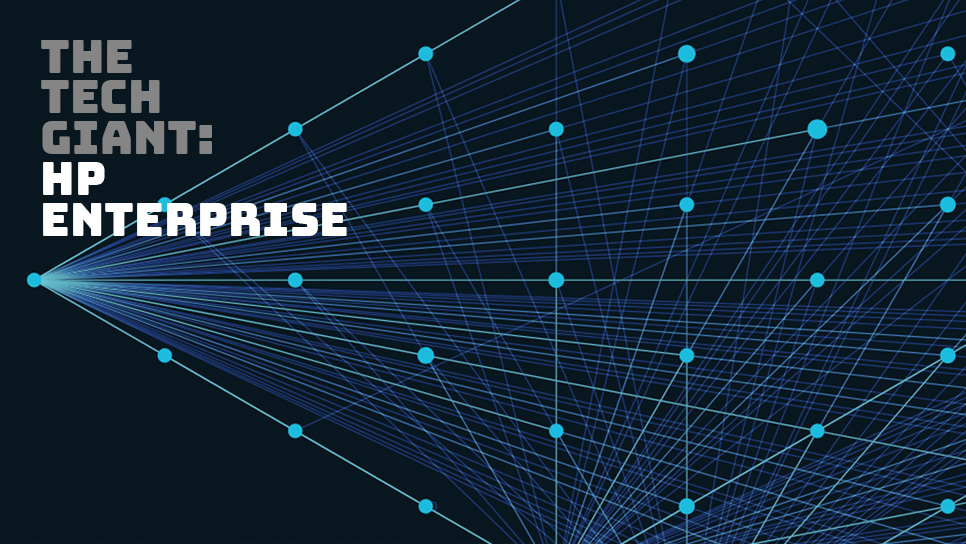
In May 2017, HPE poured US$140 million into Singapore, including the construction of a brand new campus and the launch of an accelerator, InnovateNext, which is supported by the Singapore Economic Development Board. It was hardly HPE’s first experience with the country. The company currently employs 1,600 workers on the island and plans to add more.“
HPE’s history in Singapore dates back to 1970, when we first set up operations here,” says David MH Tan, Managing Director for HPE Singapore. “Since then, we have continued to invest in Singapore because the government actively encourages a culture of collaborative innovation and focuses on accelerating the country’s future with technology.”
That collaboration is coming to a head with InnovateNext, which will support local startups by giving them access to HPE technologies as well as engineering and consulting expertise. The goal: to co-develop tech solutions across a variety of industries, including the public sector, manufacturing, distribution, financial services, communications, media and entertainment. Tan says the plan is to support 12 startups from the outset of the program.
The investment is good business for HPE, too.
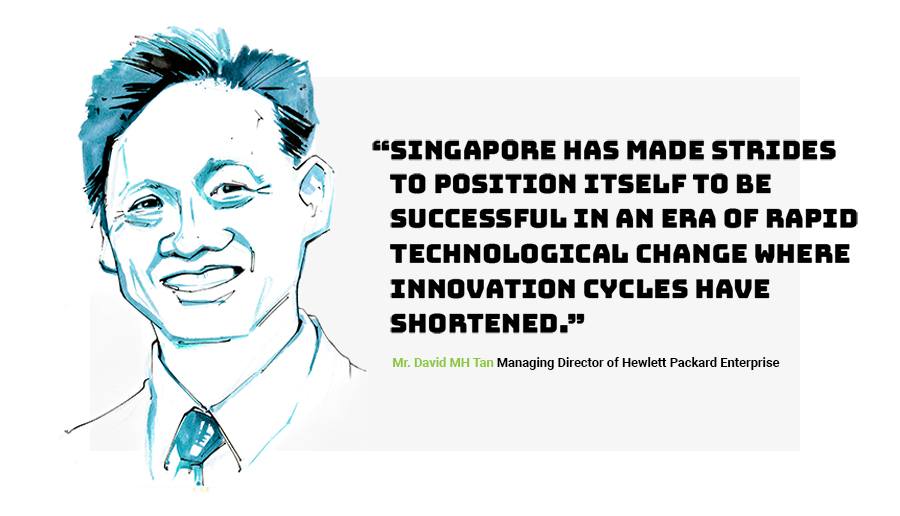
“The Singapore government has numerous initiatives that are designed to encourage live testing, talent development, and cross-industry research,” says Tan, “giving us access to a live testbed and capabilities to bring the ideation, co-innovation and commercialization phases into a single location, which allows us to innovate faster.”
None of this would be possible, Tan says, if Singapore hadn’t proven itself as an international leader in technology and business development.“
Singapore has made strides to position itself to be successful in an era of rapid technological change where innovation cycles have shortened.”
It helps that Singapore’s culture and living standards make it easy to attract employees and partners to HPE’s business ventures here.
“Singapore has a high quality of life, excellent infrastructure, and a safe and stable environment that makes people want to live here and companies want to do business here,” says Tan. “Overall, it is a great location to help support HPE’s goal to accelerate business outcomes for our customers and partners in the region.”

Puppet CEO Sanjay Mirchandani is no stranger to Singapore.
“I’ve worked with Singapore with three companies and personally lived there twice. I have a lot of firsthand experience working within Singapore and working with Singapore remotely,” he says.
Puppet makes an open-source software configuration management system that has quickly become one of the most essential components of the enterprise IT toolkit. The company has grown so quickly that, earlier this year, it formally expanded into Singapore, opening a new regional headquarters that serves the Asia-Pacific and Japan regions.
“We’re a growth company,” says Mirchandani. “As our company and community grew, Singapore became a natural location for our Asia-Pacific headquarters. A lot of our customers have large data centers in Singapore already, and it’s important to be close to them. Our customers actually asked for us to be there.”
Beyond easy access to customers, why Singapore? Mirchandani says the primary draw is access to top talent.
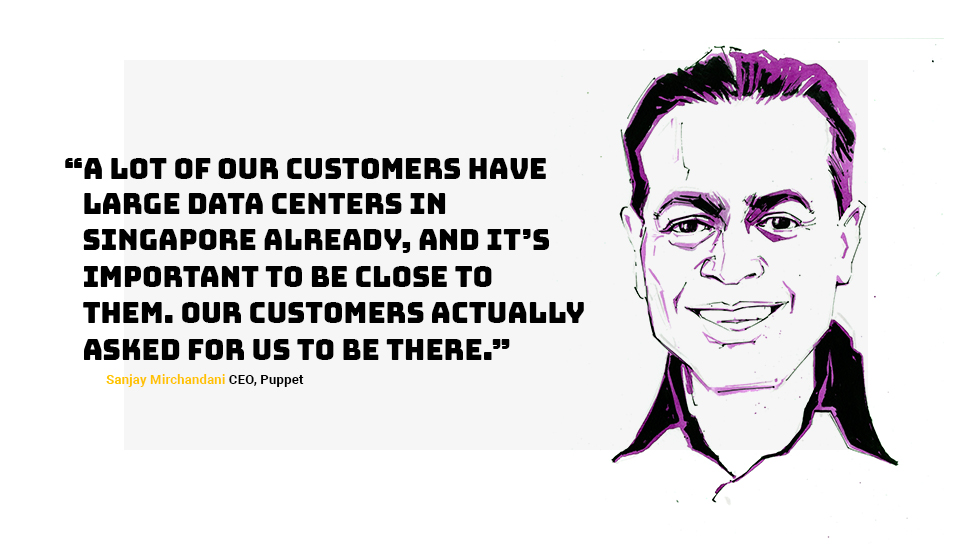
“We aim to have 30-some people working there in the next few years,” he says, “and we need people with the technical talent to support our customers in the region. Our products are widely used across Singapore, so having the ability to build that community was important. Our office was even designed to host community events.”
Mirchandani also praises the lack of bureaucracy and restrictions in opening its Singapore office.
“It was a straightforward process,” he says. “We were literally up and running in a great facility within a week.”
Ultimately, Singapore represents what seems like a perfect storm for Puppet.
“Singapore has been the hub for technology in this part of the world for a long time,” says Mirchandani. “It has a strong academic community, a great tech community and savvy local government. We’re not a massive company, so we need to be efficient in finding the right audience, and Singapore provides that.”

Palo Alto Networks may be named for one of Silicon Valley’s most famous cities, but the cybersecurity company calls Singapore home to one of its most critical offices. The company opened its first office here in 2009, made Singapore its regional headquarters in 2014 and launched its APAC headquarters here in March 2017.
"Singapore’s robust economy, political stability and business-friendly environment made the country an ideal location for our regional headquarters,” says Alvin Tan, Singapore & Malaysia regional head for Palo Alto Networks. “The country’s infrastructure, location and resources make for a conducive business environment that can support our growth plans in this region.”
Palo Alto Networks sells its security products to other businesses, which makes Singapore a perfect location for the company’s APAC headquarters. Because so many other tech related companies are already doing business here, Palo Alto has access to a critical mass of potential customers all located within a few miles of its office in the coveted Guoco Tower.
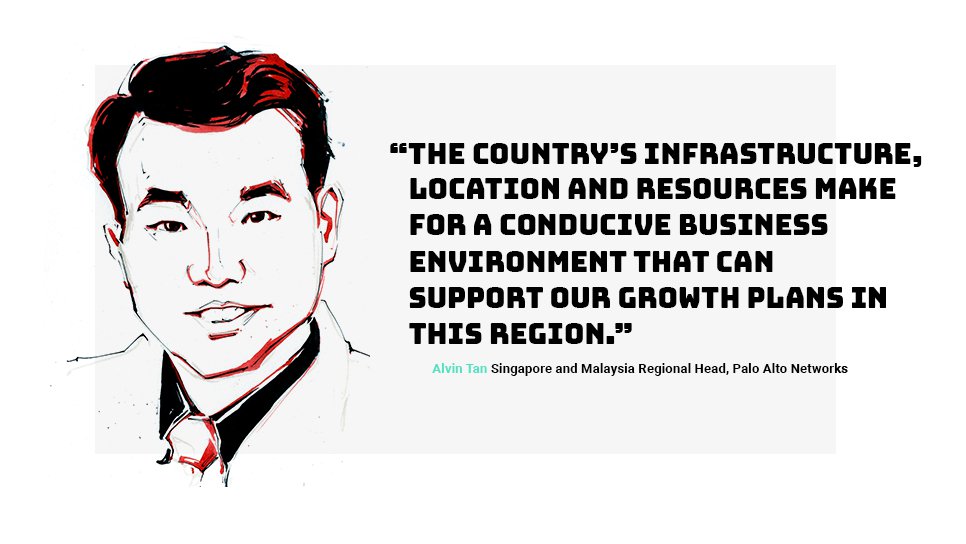
The company is even partnering directly with the Singapore government on cybersecurity initiatives. In October 2016, Palo Alto Networks inked a deal with the Cyber Security Agency of Singapore (CSA) “enabling the exchange of ideas, insights and expertise on cybersecurity,” says Tan. “The sharing of threat intelligence is being used to help develop an educational resource for outreach, training and awareness on cybersecurity and ultimately helps boost Singapore’s national cyber defense.”
Tan notes that Western companies can find it challenging (and expensive) to make the leap across the Pacific, but he says the benefits outweigh any concerns. Singapore, he says, simply has “the right mix of people, process and technology,” representing the next generation of high-tech talent.
WHERE SINGAPORE STANDS — AND WHERE IT SOARS
Berlin. Stockholm. San Francisco. These cities are widely regarded as among the hottest places in the world to launch a new business. But on the 2017 list of Best Cities for Startups compiled by Berlin-based research firm Nestpick, Singapore beat them all (as well as 80 other contenders, including Seoul, Shanghai and Beijing).
The factors that make Singapore so appealing to startups make it equally attractive to enterprise leaders looking to establish an Asian base of operations for their companies: A sophisticated IT infrastructure and pro-business ecosystem geared toward fostering innovation. A rich, readily available pool of young, highly educated tech talent and advanced software engineers. And, last but not at all least, an invaluable geographical proximity to the region’s thriving tech markets.
The global businesses large and small who are setting up shop in Singapore are as diverse as the products and services they sell, but they all have one thing in common: They see Singapore as the Asian capital of technology and entrepreneurship.
Anyone who hopes to establish or expand their company’s reach in Asia, or who dreams of creating a new venture that will change the world, would do well to take a closer look at Singapore for themselves. They just might be amazed by what they discover.
